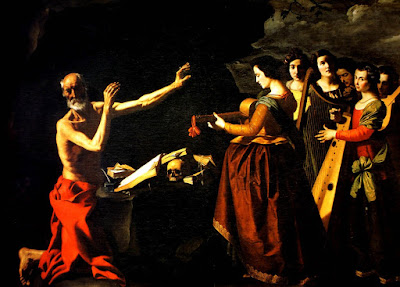 |
| Saint Jerome in the Wilderness by Bernardino Pinturicchio |
From Cicero to scorpions
 |
| Stridon bishopric seat of Roman province Dalmatia, in today Bosnia, on map of Roman Empire about 395 from "Historical Atlas" (1911) by William R. Shepherd |
Like other students, Jerome followed his studies with travel. But instead of discovering the sensuous pleasures of the empire, Jerome found himself drawn to the ascetics he met along the way, including those in Trier (now in southwest Germany) and Aquileia, Italy, where he joined a group of elite ascetics. Among them was Rufinius, famous for his translations of Origen's works. The group disbanded around 373, however, and Jerome resumed his travels, this time taking "an uncertain journey" to become a hermit in the Holy Land.
 |
| A first century AD bust of Cicero in the Capitoline Museums, Rome |
Shaken, Jerome vowed never to read or own pagan literature again. (More than a decade later, however, Jerome downplayed the dream and again began reading classic literature.) He then shuffled off to the Syrian desert, rediscovering the joys of an ascetic "prison, with none but scorpions and wild beasts for companions." He settled in Chalcis, where the rigors of this life were exhausting. He begged for letters to stave off his loneliness, hated the harsh desert food, and could not find peace.
 |
| Jerome in the desert, tormented by his memories of the dancing girls, by Francisco de Zurbarán. Rome. |
 |
| Naomi entreating Ruth and Orpah to return to the land of Moab by William Blake, 1795 |
Sharp-tongued secretary
 |
| Nicholas ordained to priesthood painted by Jan Dunselman between 1918 and 1921 |
 |
| Pope Damasus I (c. 305 – 11 December 384) was Pope from October 366 to his death in 384 (19th-century imagined portrait). |
In 382 he was summoned to Rome to be secretary and one possible successor to Pope Damasus. But during his short three-year stint there, Jerome offended the pleasure-loving Romans with his sharp tongue and blunt criticism. As one historian put it, "He detested most of the Romans and did not apologize for detesting them." He mocked the clerics' lack of charity ("I have not faith and mercy, but such as I have, silver and gold—that I don't give to you either"), their vanity ("The only thought of such men is their clothes—are they pleasantly perfumed, do their shoes fit smoothly?"), their pride in their beards ("If there is any holiness in a beard, nobody is holier than a goat!"), and their ignorance of Scripture ("It is bad enough to teach what you do not know, but even worse ... not even to be aware that you do not know").
 |
| Statue Of St. Jerome (Hieronymus) – Bethlehem, Palestine Authority, West Bank (in Jerome's time known as the Holy Land). |
Creator of the Vulgate
A wealthy student of Jerome's founded a monastery in Bethlehem for him to administer (it also included three cloisters for women and a hostel for pilgrims). Here he finished his greatest contribution (begun in 382 at Damasus's instruction): translating the Bible into everyday Latin (later to be called the Vulgate, meaning "common"). Though there were Latin versions available, they varied widely in accuracy.
 |
| Fragment of a Septuagint: A column of uncial book from 1 Esdras in the Codex Vaticanus c. 325–350 CE, the basis of Sir Lancelot Charles Lee Brenton's Greek edition and English translation. |
 |
| Complete set of scrolls, constituting the entire Tanakh. |
 |
| Judith with the Head of Holophernes, by Cristofano Allori, 1613 (Judith is the start of the Apocyphal book Judith) |
 |
| The Council of Trent, held between 1545 and 1563 in Trento (Trent) and Bologna, northern Italy, was one of the Roman Catholic Church's most important ecumenical councils. |
 |
| Papyrus 46 is one of the oldest extant New Testament manuscripts in Greek, written on papyrus, with its 'most probable date' between 175-225. |
 |
| In the Middle Ages, Jerome was often ahistorically depicted as a cardinal. |
Galli, Mark and Ted Olson, eds. 131 Christians Everyone Should Know. Nashville: B&H Publishing Group, 2000, pages 337-339.














